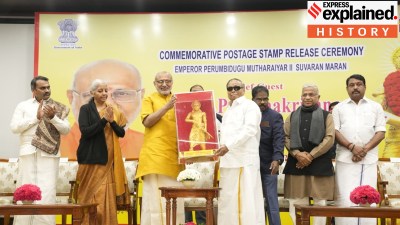Rahul Gandhi’s appeal dismissed by Gujarat HC. What does this mean?
The Congress leader can now move the Supreme Court. Meanwhile, he stays disqualified from Parliament. What is the case that led to this situation?
 The latest order means that Rahul Gandhi, who had been elected to Lok Sabha from Wayanad in Kerala in 2019, remains disqualified from Parliament. He can now go to the Supreme Court to appeal against the decision of the High Court. (Express file photo by Prem Nath Pandey)
The latest order means that Rahul Gandhi, who had been elected to Lok Sabha from Wayanad in Kerala in 2019, remains disqualified from Parliament. He can now go to the Supreme Court to appeal against the decision of the High Court. (Express file photo by Prem Nath Pandey) The Gujarat High Court has dismissed Rahul Gandhi’s plea seeking a stay on his conviction in a criminal defamation case in which he has been sentenced to two years in prison.
In April, a sessions court in Surat had dismissed the Congress leader’s appeal against the conviction order passed by a magistrate’s court in the previous month.
This means that Rahul, who had been elected to Lok Sabha from Wayanad in Kerala in 2019, remains disqualified from Parliament. He can now go to the Supreme Court to appeal against the decision of the High Court.
What was the case against Rahul Gandhi?
The incident itself dates back to April 13, 2019. Rahul was campaigning for the Lok Sabha elections, and at an election rally in Kolar, Karnataka, he said in Hindi: “Why do all thieves, be it Nirav Modi, Lalit Modi, or Narendra Modi, have the surname ‘Modi’?” He was making a rhetorical reference to the fugitive jeweller Nirav Modi and the former cricket administrator Lalit Modi, both of whom face allegations of financial fraud.
The day after Rahul’s speech, a local BJP leader and former Gujarat state minister, Purnesh Modi, filed a private complaint before the Chief Judicial Magistrate, Surat, accusing the Congress leader of having defamed everyone with the name Modi.
On March 23, 2023, Magistrate H H Verma found Rahul guilty of criminal defamation under IPC Section 500, and gave him the maximum sentence allowed under that section, which is two years in jail. The court’s decision triggered Section 8(3) of The Representation of the People Act, 1951, which states: “A person convicted of any offence and sentenced to imprisonment for not less than two years shall be disqualified from the date of such conviction and shall continue to be disqualified for a further period of six years since his release.”
In consequence, on March 24, the Lok Sabha Secretariat issued a notification saying that Rahul stood disqualified from the House with effect from March 23, the date of his conviction.
What did Rahul Gandhi do after the disqualification order?
On April 3 this year, Rahul moved the next higher court, the Surat sessions court, in appeal. He filed two applications, one for the suspension of the two-year sentence, and the other for the suspension of conviction.
Rahul submitted to the sessions court that it seemed “reasonable to argue” that the maximum sentence awarded to him was to “attract the order of disqualification (as an MP)”. Had the second application been allowed, his membership of Lok Sabha would have been restored.
On April 13, Additional Sessions Judge R P Mogera said he would pronounce his order on April 20. On that day, the court rejected both applications.
Rahul then moved the Gujarat High Court in appeal. The court heard the petition against his conviction in April and May. Arguments were concluded on May 2, and the court said the verdict would be delivered after the summer vacation.
And what has the court said on Friday (July 7)?
Justice Hemant Prachchhak, read out the operative part of the verdict aloud, stating that the sessions court order refusing to grant a stay on his conviction earlier was “just and legal”.
Granting such a stay would be an exception rather than the rule, the court observed, adding that Rahul would suffer no injustice if the conviction was not stayed. However, the court said that the criminal appeal should be decided on merits, and as expeditiously as possible.
The court took into account that Rahul faces about 10 criminal cases, including a criminal defamation case filed by the grandson of V D Savarkar.
So what will Rahul Gandhi do now?
The Congress party’s head of communications Jairam Ramesh has said that they would “pursue the matter further”. This essentially means that Rahul has to move the highest court against the High Court’s order.
Rahul’s disqualification could have been reversed if the High Court had granted a stay on the conviction by the magistrate’s court or decided the appeal against the sessions court’s order in his favour. In a 2018 decision in ‘Lok Prahari v Union of India’, the Supreme Court had clarified that the disqualification “will not operate from the date of the stay of conviction by the appellate court”.
- 01
- 02
- 03
- 04
- 05






































